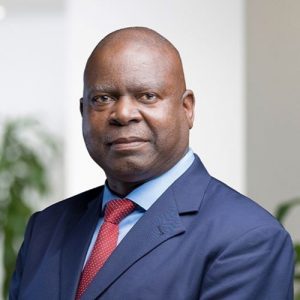

ECONET Wireless Zimbabwe remains the country’s leading mobile network operator due to its sustained investment in mobile telecommunications infrastructure, the latest industry report has shown.
According to the Postal and Telecommunications Regulatory Authority of Zimbabwe (Potraz) first quarter Sector Performance report, Econet controlled 66.8 percent of the country’s 13 million subscribers in the quarter, up from 66.5 percent in the fourth quarter of 2020.

Econet Wireless CEO, Douglas Mboweni
At the same time, State-owned mobile operator NetOne’s market share went up slightly from 28 percent to 28.7 percent, while Telecel lost 1 percent market share, to end the quarter at 4.5 percent.
The report shows that Econet’s market leadership derives from the company’s continuous investment in telecommunications infrastructure.
The Zimbabwe Stock Exchange-listed company deployed 16 new base stations in the period under review, taking its total to 5 019. NetOne set up 14 new base stations in the first quarter while Telecel did not deploy any.
“A comparison with the fourth quarter of 2020 shows that there was no significant change in the market share of mobile base stations. Econet continues to be the dominant operator in terms of 2G, 3G as well as LTE coverage. There was a slight improvement in 2G and 3G population coverage due to the new deployments,” Potraz said.
Although the country is yet to attain 100 percent population coverage for all network technologies, Econet enjoys two thirds market share of mobile base station infrastructure.
Potraz noted that total mobile operator revenues grew by 12.3 percent to record ZW$13.8 billion in the first quarter of 2021, from ZW$12.3 billion recorded in the fourth quarter of 2020.
“All the mobile operators recorded growth in revenues. The growth in revenue is attributable to the growth in voice as well as Internet and data traffic,” the regulator said.
Notwithstanding a rise in revenues, operating costs grew by 34.1 percent to record ZW$7.6 billion in the period under review, from ZW$5.7 billion recorded in previous quarter – mostly as a result of depreciation and bandwidth costs which continued to constitute the bulk of mobile network operaters’ costs.
Potraz also bemoaned foreign currency shortages that are affecting investment in the sector, as well as hampering the country’s digitisation drive.
“The shift to the auction-based foreign currency market system seemingly eased inflationary pressures, but did not eliminate them completely as prices for goods and services, including fuel and energy, continued to be adjusted in line with the dynamics of the new exchange rate regime.

“Notwithstanding the above, foreign currency shortages continued to bedevil the economy at large, with implications on network expansion, upgrade and maintenance taking a toll on quality of service as demand for data surged for operators. Foreign currency constraints also affected universal service projects targeted for rural and underserved areas,” the report read in part.
In addition, the regulator called for concerted efforts in the consolidation of strategies that deliberately focus on ICT development, executing smart policies and effective processes that embolden investments in ICTs and digital skills, and embracing emerging technologies that are crucial to the digital economy.
“Indeed, the COVID-19 pandemic has shone a light on the urgent need for accelerating digital transformation. The necessity for greater investment in digital technologies, skills, resilience and innovation can never be overemphasised. Never before in our lifetime have circumstances changed so fast, and has there been a greater need to adapt,” Potraz said.